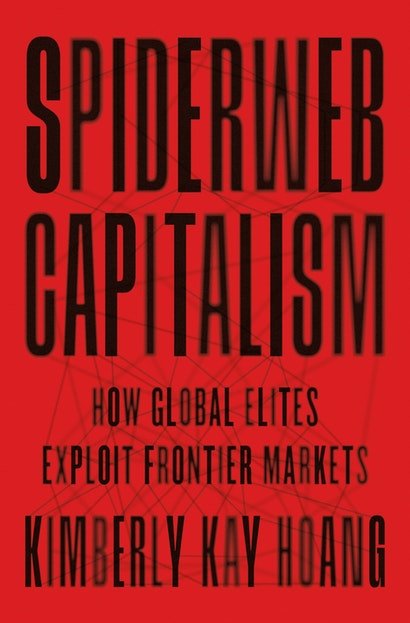In 2015, the anonymous leak of the Panama Papers brought to light millions of financial and legal documents exposing how the superrich hide their money using complex webs of offshore vehicles. Spiderweb Capitalism takes you inside this shadow economy, uncovering the mechanics behind the invisible, mundane networks of lawyers, accountants, company secretaries, and fixers who facilitate the illicit movement of wealth across borders and around the globe.
Kimberly Kay Hoang traveled more than 350,000 miles and conducted hundreds of in-depth interviews with private wealth managers, fund managers, entrepreneurs, C-suite executives, bankers, auditors, and other financial professionals. She traces the flow of capital from offshore funds in places like the Cayman Islands, Samoa, and Panama to special-purpose vehicles and holding companies in Singapore and Hong Kong, and how it finds its way into risky markets onshore in Vietnam and Myanmar. Hoang reveals the strategies behind spiderweb capitalism and examines the moral dilemmas of making money in legal, financial, and political gray zones.
Dazzlingly written, Spiderweb Capitalism sheds critical light on how global elites capitalize on risky frontier markets, and deepens our understanding of the paradoxical ways in which global economic growth is sustained through states where the line separating the legal from the corrupt is not always clear.
Princeton University Press (September 6, 2022)
Reviews
A revealing look at how a secretive, often criminal element enables the rich to “make and protect not only their money, but also their reputations.”
“Hoang, a professor of sociology at the University of Chicago, takes a deep dive into the everyday economics of “frontier markets,” places where investors make fortunes by greasing the palms of willing government officials and bankers. One such place is Vietnam, where, one wheeler-dealer told her, business students have to abandon their models as mere “bullshit” precisely because “there are too many unpredictable variables.” Instead, that source noted, an investor must be adept at “playing in the grey”—i.e., operating in the vast area that lies between legal and illegal economic activity and all too often strays into the criminal. The gray zone harbors a massive network of enablers and go-betweens who perform such essential tasks as laundering money and helping investors avoid paying taxes. The result is the titular “spiderweb capitalism,” in which “most capital accumulation takes off through a set of transactions that are often considered corrupt and dirty.” Of course, spiderwebs are designed to trap prey, and the prey in question are ordinary taxpayers and law-abiding citizens. Close to the center of the web are the ultrawealthy, surrounded by concentric rings of “fixers” who attend to their needs for a surprisingly small portion of the proceeds, selling themselves cheap. Often, these are financial insiders who do such useful things as disguising the location of their beneficiaries, since, as Hoang notes, “offshore funds and banks are less likely to do business with anyone who has a US mailing address or passport” because of comparatively stringent U.S. tax laws. In this well-written study, Hoang shows how inequality is a direct consequence of this spiderweb capitalism, which constitutes a zero-sum game in which drug cartels, organized crime, and the superrich are indistinguishable.” —Kirkus Reviews
“Kimberly Kay Hoang has done groundbreaking fieldwork shedding light on the complex web of offshore subsidiaries through which capital is channeled and protected in emerging markets. This book, which summarizes this work in a clear and engaging manner, is essential reading to understand global twenty-first-century capitalism.”—Gabriel Zucman, author of The Hidden Wealth of Nations
“In this groundbreaking and gripping book, Hoang invites us to walk into the spider’s parlor that is the universe of global high finance. Her piercing prose lays bare the intricate webs of dealings the superrich are free to weave, with secretions that dissolve the legal, moral, institutional, and sovereign boundaries trapping the rest of the world. A brave and powerful treatise on the making of twenty-first-century capital.”—Ching Kwan Lee, author of The Specter of Global China
BOOK PRIZES
Society for the Advancement of Socio-Economics, Alice Amsden Best Book Award,2024.
Society for the Study of Social Problems, Global Division Outstanding Book Award,2024.
Association of American Publishers (AAP), R.R. Hawkins Award, 2023.
AAP, Prose Award for Excellence in the Social Sciences, 2023.
AAP, Prose Category Winner in Business, Finance, and Management, 2023.
American Sociological Association (ASA), Section on Asia and Asian American Studies Section, Asia/Transnational Book Award, 2023.
ASA Global & Transnational Sociology, Best Scholarly Book Award, 2023.

